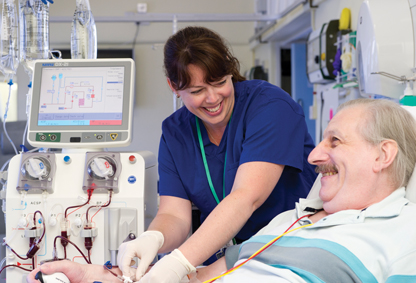Lowering your blood cholesterol with lipoprotein apheresis
Lipoprotein apheresis, sometimes called LDL apheresis, is a type of 'extracorporeal' (blood taken outside the body) procedure to remove low-density lipoprotein (LDL) cholesterol from the blood.
Lipoprotein apheresis is considered for those patients who, despite the maximum amount of drug treatment and a cholesterol-lowering diet, still have a high level of LDL cholesterol.
How is lipoprotein apheresis performed?
Lipoprotein apheresis circulates a portion of the blood outside the body and passes it through a special adsorber column. This removes the LDL cholesterol and then returns the treated blood back to your body. It also removes lipoprotein (a) and triglycerides but has only a small effect on high-density lipoprotein (HDL).
The treatment involves placing two needles (cannulae) into your veins - one to remove the blood and the other to return the treated blood to you. It is important that we can obtain sufficient blood flow for the machine to work effectively.
Usually, the veins in the arms are sufficient. If there are repeated problems with the veins we occasionally suggest a permanent cannula in the chest or formation of a shunt in the arm, similar to those used in patients having renal dialysis.
How does the treatment affect my LDL cholesterol levels?
Lipoprotein apheresis can lower your LDL level by 50 to 65 per cent after a single treatment. The amount of blood treated and your original blood level determine the exact effect.
However, the reduction in cholesterol does not remain over time. This is because your raised LDL level is the result of an underlying metabolic problem and the treatment does not correct this. The LDL level will begin to increase immediately after the treatment.
This is why treatments need to be carried out either every week or every two weeks. In order for the treatment to maintain a lower level of LDL cholesterol, it must be performed regularly.
Treatment is life-long therapy and you must continue to take your cholesterol-lowering medication and maintain a low fat diet.
Will I have any adverse reaction to the treatment?
Adverse reactions associated with lipoprotein apheresis can include:
- hypotension (low blood pressure)
- nausea
- light-headedness
- headache
- anaemia
- chest pain
- fast or slow heart rate
- abdominal discomfort
- blood loss
These reactions are not common and you will have two nurses with you throughout your treatment. They will be able to deal with any of these problems if they occur.
It is possible that you may feel a little light-headed for the first few treatments. This is easily treated by laying you flat and you may be given some saline solution.
You may also feel very tired and a bit irritable the day after the treatment.
Your blood has to be thinned before it is passed through the machine. This is achieved with a special solution called ACD-A. The use of this solution can sometimes cause a temporary drop in the level of calcium in your blood.
If this happens you may feel slight tingling or stiffness of the joints. To prevent this we give you calcium tablets to take on the day of your treatment. We ask you to take one in the morning and we will then give you another tablet during the treatment. Occasionally we ask you to take another tablet in the evening. Please bring your calcium tablets with you on your treatment day.
All the parts of the machine which come into contact with your blood are sterile, used for one treatment only and are then disposed of.
What can I do to minimise adverse reactions?
- Please do not have the treatment on an empty stomach. Make sure you eat and drink enough before we start your treatment. You may also eat and drink during the procedure.
- Do not drink alcohol during the 24 hours before your treatment.
- Do not perform strenuous exercise on the day of your treatment.
- Do not take any beta blocking tablets on the day of your treatment (e.g. Atenolol, Propanolol, Metoprolol, and Bisoprolol) or any other medication to lower your blood pressure. Please continue your medication as normal the following day.
- You may need to have an iron supplement if you develop anaemia.
- Try to avoid activities increasing the risk of physical injury for 24 hours after your treatment due to the blood-thinning medication used.
- After your treatment you will need to rest for the remainder of the day.
- ACE inhibitor medication cannot be taken by patients undergoing lipoprotein apheresis (medication such as Ramipril, Lisinopril and Perindopril). If a doctor suggests starting any of these medications please ask him or her to contact us.
Familial Hypercholesterolaemia is an inherited genetic disorder that can cause early heart disease and can lead to premature death.
Contact us
If you have any questions please ask one of the apheresis team. You can talk to us in person or contact us by phone or email.
Phone: 01895 826 563
Email: gstt.apheresis@nhs.net
Lead nurse
Alison Pottle
Consultant Nurse in Cardiology
Phone: 01895 823 737 bleep 6137
Email: apottle@nhs.net
Patients with a genetic disorder of cholesterol metabolism called familial hypercholesterolaemia (FH) may require apheresis treatment.
Visit the Lipoprotein Foundation website for more information about lipoprotein apheresis.
Find us
Royal Brompton Hospital
Royal Brompton Hospital, Sydney Street, London SW3 6NP
For information about how to get here, including public transport and parking information, visit our Royal Brompton Hospital directions page.
Harefield Hospital
Harefield Hospital, Hill End Road, Harefield, Middlesex, UB9 6JH
For information about how to get here, including public transport and parking information, visit our Harefield Hospital directions page.
Further information
Find out more about nursing on our lipoprotein apheresis unit at Harefield Hospital.

